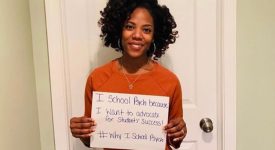Saint Rose school psychology master's program sees growth as the need for professionals also increases
September 30, 2020 · 2020
For many of us living through the COVID-19 pandemic, terms like “anxiety,” “depression,” and “learning difficulties” have become household terms. But school psychologists have been addressing these issues for decades.
“The recent increased focus on mental healthcare for children is bringing more clarity to the role of the school psychologist,” says Dr. Andrew Shanock, associate professor of school psychology at Saint Rose. “If you don’t have mental-health safety, it’s difficult to learn. Our school psychologists help teachers, kids, and families develop that safety.”
Shanock directs Saint Rose’s school psychology master’s program, which prepares qualified, creative, caring school psychologists to address the important mental-health and learning challenges facing our nation’s schoolchildren.
And Saint Rose is busy building the pipeline of school psychology graduates. Since Fall 2017, school psychology enrollment has grown 45%. This year, new student enrollment increased 39% over Fall 2019. The Saint Rose program is one of the top-three producers of Nationally Certified School Psychologist (NCSP) in the United States.
Program graduates are valued for their broad skill base, which includes counseling and consultation, testing and evaluation, and mental-health and academic intervention, honed by experience working with all different types of populations – rural, urban, suburban.
“They become the psychologists who know the most about education, and the educators who know the most about psychology,” Shanock says.
The faculty constantly receive requests for school psychologists from districts around the country. This demand is thanks in part to the strong representation of program alums in Massachusetts, Vermont, Arizona, South Carolina, North Carolina, Florida, and California, in addition to New York.
“We have maintained excellence as reflected by our 100% pass rate on National Praxis II exam for the past 12 years, nearly 100% employment rate, and national recruitment of our graduates by hiring school districts,” says Dr. Steve Hoff, an associate professor of school psychology at Saint Rose.
And our alums, Shanock adds, are always ready to help new graduates who move to their part of the country.
Wearing many hats
Of late, school psychologists are facing arguably more challenges than ever, from racial and social inequity-related disparities in healthcare, living conditions, income, employment, education, violence, and food security, to pandemic-related job loss and the difficulties of remote learning.
“School psychologists have a precious opportunity, and a responsibility to be tireless advocates for children and families, especially those from groups who have had to endure inequitable and racist policies and practices,” Hoff says.
He adds that school psychologists can implement interventions that make a huge difference.
“One surprising thing that I have learned about being a school psychologist is the number of jobs within our title,” says Lajuana Berry G’21. “The ability to advocate for students and parents, step in for a crisis intervention, assess students so that they can obtain the services that they need and deserve, and collaborate with other staff members has been uplifting and meaningful throughout my time in the program.”
Hands-on experience in a family environment
All faculty members are practicing school psychologists who bring hands-on cases and knowledge to the learning experience.
In the context of discussing personality and identity development in his mental-health class for incoming students, for example, Hoff, who has his own practice in western Massachusetts, brought up the case of one of his clients, an adolescent girl from Central America who had been adopted by a White family.
“She is experiencing some challenges related to thoughts about her birth parents and wanting to know more about her cultural heritage,” Hoff says. “My students have been able to think about her situation, and apply the theories they are learning, to understand her experience.”
An important part of the program is the required internship, which for years has supplied interns to districts throughout New York State and beyond.
“We set our students up for the best possible internship experience,” Shanock says, adding that faculty work hard to match students’ preferences. “Students receive constant support from their supervisors in the field, as well as from faculty. They always blossom.”
Faculty use their creativity and connections to find meaningful internship experiences. For instance, current interns are providing career coaching to young adults on the autism spectrum, in addition to working in school districts. Other internship duties include remote consulting to support teachers working with children and remote group therapy.
In addition to hands-on experiences, all students conduct research and are encouraged to explore their area of interest.
“Research was a big part of my undergrad career, and I was happy when I found out that our program supports students wanting to explore this facet of academia,” says Sarah Uzzi G’21. “In 2019, about half of my cohort presented at a poster presentation at the New York Association of School Psychologists. The professors and a few alumni were able to come to the presentation.”
Uzzi, who had also considered counseling and clinical psychology, chose school psychology because it would allow her to be of the greatest help to children.
“School is where children spend most of their time, outside of the home, and if a student was having difficulties in an area of their life, I felt that I could help them more being in the school with them,” she says. “School psychologists support students academically, emotionally, behaviorally, and socially, and collaborate with teachers, parents, service providers, and administrators to provide the best possible educational experience.”
The cohort is a tightly knit group of 20 that learns and works together for the three years required by the 69-credit, full-time program, which also includes a remote component that has proved a boon under pandemic conditions. The program doesn’t require an undergraduate degree in education or psychology and has included students with bachelor’s degrees in English, history, business, and counseling, and it builds upon the personality and individual strength of each candidate.
“We create a real family atmosphere,” says Shanock, adding that each prospective student participates in a group interview with all current students and faculty. “We want to make sure they understand who we are and ensure that they will be comfortable in our program.”
“Coming to Saint Rose for my first full-time faculty job was the best decision I ever made,” says Dr. Elizabeth Power, an assistant professor who joined Saint Rose from the faculty of The Chicago School of Professional Psychology. “I came here because Andrew Shanock and Steve Hoff promised me mentorship and a scaffolded learning experience – the same experience we provide to our students.”
A THRIVE-ing cohort
Cohort diversity received a recent boost from a federal grant from Project THRIVE, which supports school-psychology and special-education candidates, and especially encourages candidates from underrepresented groups.
“The grant has spurred more diversity among our incoming classes in all respects: gender identity, sexual identity, race, culture, ethnicity, nationality, and disability status,” Shanock says.
“Increasing diversity within our programs, we hope, will allow for us on the faculty to learn how to be more culturally responsive to future cohorts,” Power adds. “Increased diversity in our classrooms allows us to be exposed to a microcosm that is truly representative to our world. With exposure to folks of different races, gender identities, abilities, and more, we are pushed to be more aware of our own biases and how we treat others.”
“Our students live out their passion through being a school psychologist,” says Shanock. “They become the school psychologist they want to be.”
Adds Berry: “Saint Rose has taught me how to be vocal in times of need, be confident and proud of my work ethic and skills and helped me improve those skills, and be culturally, linguistically, and socially aware of every child – because the ability to adapt in all situations is what makes a great school psychologist!”
By Irene Kim
Below, Mental Health Interventions class with Dr. Steve Hoff, associate professor of school psychology.


